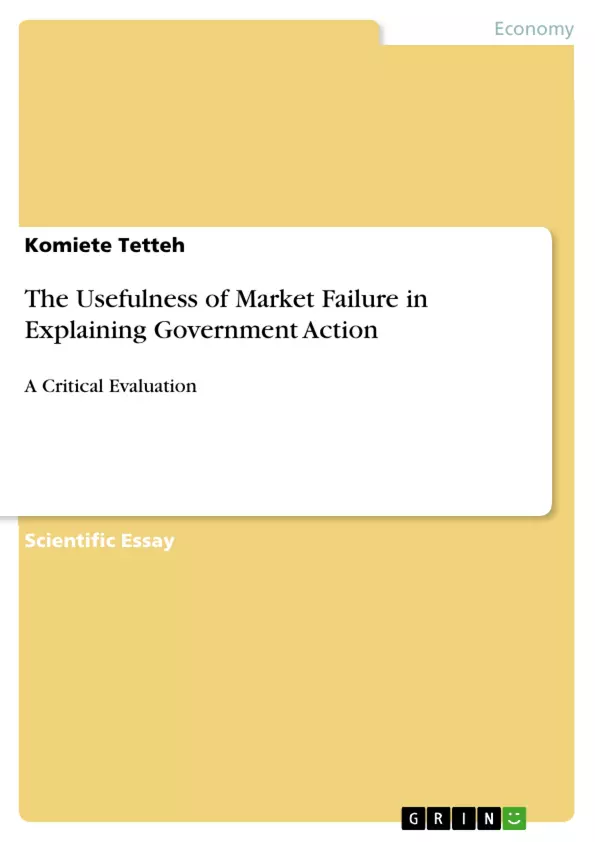This paper contributes to the discourse on the usefulness of market failure as an explanatory and justificatory tool for public policy and government action. Critically examining and evaluating market failure's theoretical robustness, ideological underpinnings, institutional claims and practical application, it argues that while the tool offers some insights into what governments (can) do, it fails to provide a compelling answer to the fundamental question of why governments exist. It is suggested that alternative approaches and theorizations such as institutional political economy and historical inquiry offer more comprehensive explanations for understanding the role and relationship between the state and the market.
Inhaltsverzeichnis (Table of Contents)
- Preamble
- Overview of Market Failure Theory
- Monopoly
- Public Goods
- Externalities
- Imperfect Information
- Public Policy Implications of Market Failure
- Regulation
- Provision
- Subsidy
Zielsetzung und Themenschwerpunkte (Objectives and Key Themes)
This paper examines the effectiveness of market failure as an explanatory and justificatory tool for government action. It delves into the theory's core doctrine, its underlying assumptions, and its practical application in public policy. The paper critically analyzes market failure, arguing that while it provides insights into potential government activities, it falls short of offering a comprehensive explanation for the very existence of government.
- The theoretical robustness of market failure
- The ideological underpinnings of market failure
- The practical application of market failure in public policy
- Alternative approaches to understanding the role of the state
- The limitations of market failure in explaining government action
Zusammenfassung der Kapitel (Chapter Summaries)
The paper begins by introducing the concept of market failure and its role in justifying government intervention. It then delves into the theoretical framework of market failure, exploring the idealized "normative market" model and its inherent shortcomings, from which the justification for government intervention is derived. The paper further examines the various ways in which market failure informs public policy design, focusing on specific policy interventions such as regulation, provision, and subsidies. It concludes by critically evaluating the usefulness of market failure in explaining government action, arguing that it provides a limited and flawed perspective. The paper proposes alternative theoretical frameworks, including institutional political economy, historical inquiry, and empirical studies of the state, as more comprehensive means of understanding the state-market relationship.
Schlüsselwörter (Keywords)
The primary keywords and focus topics of this paper include market failure, state intervention, neoliberalism, efficiency, public policy, government action, and alternative theorizations.
Frequently Asked Questions
What is market failure theory?
Market failure theory suggests that under certain conditions, private markets fail to allocate resources efficiently, which is often used to justify government intervention in the economy.
What are the main types of market failure?
The core types discussed include monopolies, public goods (non-excludable and non-rivalrous), externalities (side effects on third parties), and imperfect or asymmetric information.
How does the government respond to market failures?
Governments use various policy tools such as regulation (to control monopolies), direct provision (for public goods), and subsidies or taxes (to address externalities).
What are the limitations of explaining government action through market failure?
Critics argue that the theory is too narrow and fails to explain why governments exist in a broader social and historical sense, often ignoring political and institutional factors.
What are alternative theories to market failure?
Alternative frameworks include institutional political economy and historical inquiry, which offer more comprehensive explanations of the relationship between the state and the market.
- Citation du texte
- Komiete Tetteh (Auteur), 2013, The Usefulness of Market Failure in Explaining Government Action, Munich, GRIN Verlag, https://www.grin.com/document/263574



